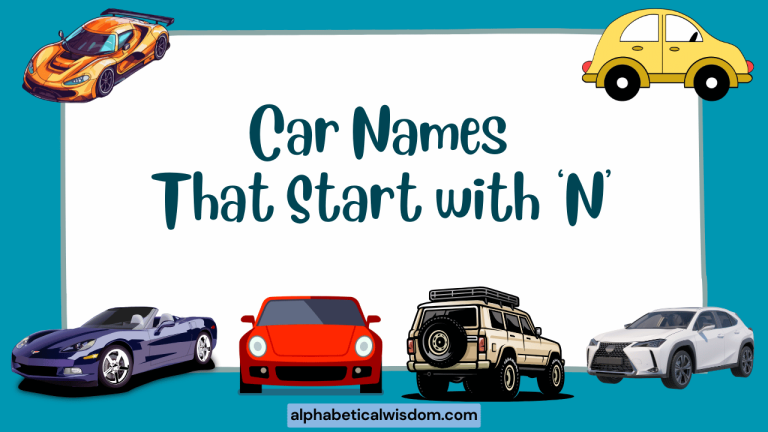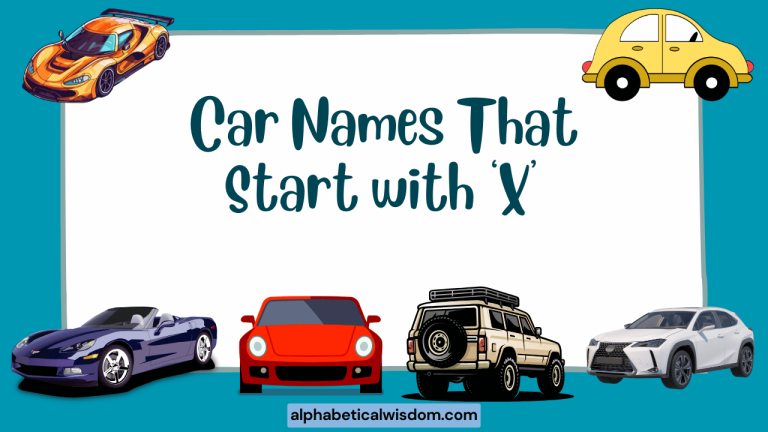Car Names That Start With ‘L’: A Grammatical Exploration
Understanding the nuances of English grammar extends beyond basic sentence structures. Examining specific categories, such as car names starting with the letter ‘L’, allows us to explore how language shapes our perception and branding.
This article delves into the grammatical aspects of these car names, analyzing their structure, usage, and impact. Whether you’re an English language learner, a marketing professional, or simply a car enthusiast, this guide offers valuable insights into the fascinating intersection of language and automobiles.
By studying these names, we can learn about the power of language in creating memorable and effective brand identities. This exploration will cover the types of words used, their grammatical functions, and the overall effect they have on consumers.
Join us as we embark on a journey through the world of car names beginning with ‘L’, uncovering the grammatical principles that underpin their creation and success.
Table of Contents
- Introduction
- Definition: Car Names and Grammar
- Structural Breakdown of Car Names
- Types of Car Names Starting with ‘L’
- Examples of Car Names Starting with ‘L’
- Usage Rules and Conventions
- Common Mistakes and Misconceptions
- Practice Exercises
- Advanced Topics in Car Name Grammar
- Frequently Asked Questions
- Conclusion
Definition: Car Names and Grammar
Car names, while seemingly simple, often incorporate various grammatical elements to create a memorable and impactful brand identity. Grammar, in this context, refers to the system and structure of a language, encompassing syntax, morphology, and semantics.
When applied to car names, we analyze how these names are constructed, what types of words are used, and the meanings they convey.
A car name can function as a noun, an adjective, or even a verb, depending on its intended use and the marketing strategy behind it. The grammatical structure of the name influences how consumers perceive the car and its attributes.
For example, a name like “Legend” (Honda) functions as a noun, suggesting a sense of history and prestige. Analyzing these names through a grammatical lens helps us understand the subtle ways language shapes our perceptions and choices.
Classification of Car Names
Car names can be broadly classified based on their grammatical function. These classifications help in understanding the intent and impact of the name:
- Proper Nouns: Names that identify a specific car model (e.g., Lancer, LaCrosse).
- Abstract Nouns: Names that convey a quality or concept (e.g., Legacy, Legend).
- Adjectives: Names that describe a characteristic of the car (e.g., Luxurious, Lively).
- Verbs: (Less common) Names that suggest an action or experience (e.g., rarely used, but imagine “Leap”).
- Compound Names: Names that combine two or more words (e.g., Land Cruiser, though not starting with ‘L’, illustrates the structure).
Function of Car Names
The function of a car name extends beyond simple identification. It serves several crucial purposes:
- Branding: Creating a unique and recognizable identity for the car.
- Marketing: Communicating the car’s features and benefits to potential buyers.
- Differentiation: Distinguishing the car from its competitors in the market.
- Emotional Connection: Evoking feelings and associations that resonate with consumers.
Contexts of Car Name Usage
Car names are used in various contexts, each influencing their interpretation and impact:
- Advertising: Names are prominently featured in advertisements to capture attention and create a lasting impression.
- Product Literature: Brochures and manuals use names to provide detailed information about the car.
- Online Reviews: Car reviews and articles frequently mention names when discussing the car’s performance and features.
- Word-of-Mouth: Consumers use names when discussing their experiences with the car.
Structural Breakdown of Car Names
The structural breakdown of car names involves analyzing their phonetics, morphology, and syntax. Phonetics examines the sounds of the name, while morphology focuses on the structure of words, including prefixes, suffixes, and root words.
Syntax, although less directly applicable to single-word names, considers how the name fits into larger phrases and sentences.
Understanding these structural elements helps us appreciate the artistry and intentionality behind car name creation. A well-structured name is not only memorable but also conveys specific attributes and values associated with the car.
Phonetics and Sound Symbolism
The sounds of a car name can significantly influence its perceived attractiveness. Certain sounds are associated with different qualities.
For example, soft sounds like “L” and “M” can evoke feelings of luxury and comfort, while harder sounds like “K” and “T” might suggest power and performance. The phonetic structure of car names is carefully considered to create the desired impression.
Sound symbolism, also known as phonetic symbolism, is the idea that certain sounds are inherently associated with certain meanings. For instance, the sound “L” is often linked to fluidity and smoothness, which can be advantageous for car names aiming to convey a sense of ease and elegance.
Morphological Analysis
Morphology is the study of word structure. Analyzing the morphological components of a car name can reveal its etymological roots and underlying meaning.
Prefixes, suffixes, and root words all contribute to the overall impact of the name.
For example, in the name “Legacy,” the root word “lega-” relates to law or something handed down, suggesting tradition and reliability. Understanding these morphological elements adds depth to our appreciation of car names.
Syntactic Considerations
While car names are typically single words or short phrases, their syntactic function is important when they are used in marketing materials and other contexts. The name must fit grammatically into sentences and phrases to ensure clarity and coherence.
For example, “The new Lexus is here!” demonstrates how the car name “Lexus” functions as a proper noun within a sentence. The syntactic role of the name contributes to its overall effectiveness in communication.
Types of Car Names Starting with ‘L’
Car names starting with the letter ‘L’ can be categorized based on their semantic meaning and the attributes they are intended to convey. These categories include names that evoke luxury, performance, heritage, and nature.
By understanding these different types, we can better appreciate the range of strategies employed by car manufacturers to create compelling brand identities.
Luxury and Elegance
Some car names starting with ‘L’ are designed to evoke feelings of luxury, sophistication, and elegance. These names often use words associated with high status, comfort, and refinement.
Examples include Lexus, which is synonymous with luxury vehicles, and LaCrosse, which suggests a sense of refined style. These names aim to appeal to consumers seeking prestige and comfort.
Performance and Power
Other car names starting with ‘L’ emphasize performance, power, and speed. These names often use words that suggest agility, strength, and excitement.
For instance, Lancer (Mitsubishi) suggests a dynamic and aggressive driving experience. These names target consumers who value performance and driving pleasure.
Heritage and Tradition
Certain car names starting with ‘L’ are chosen to convey a sense of heritage, tradition, and history. These names often evoke feelings of nostalgia and reliability.
Examples include Legacy (Subaru), which suggests a lasting impact and enduring quality. These names appeal to consumers who appreciate established brands and time-tested values.
Location-Based Names
Some car names are inspired by locations, either real or imagined. These names can evoke a sense of adventure, exoticism, or regional pride.
While not as common with “L”, understanding this category provides a broader context.
While less common for “L” car names, understanding this category is important. For example, a hypothetical “Lakewood” could evoke a sense of natural beauty and tranquility.
These names appeal to consumers who associate the location with positive attributes.
Examples of Car Names Starting with ‘L’
This section provides a comprehensive list of car names starting with the letter ‘L’, categorized by their grammatical function and semantic meaning. Each example is accompanied by a brief explanation of its intended effect and potential connotations.
These examples illustrate the diverse range of strategies employed by car manufacturers to create memorable and impactful brand identities.
Proper Noun Examples
The following table lists car names that function primarily as proper nouns, identifying specific car models.
| Car Name | Manufacturer | Description |
|---|---|---|
| Lancer | Mitsubishi | A compact car known for its sporty performance. |
| LaCrosse | Buick | A mid-size sedan marketed as a luxury vehicle. |
| LeBaron | Chrysler | A series of cars produced by Chrysler from 1977 to 1995. |
| Legacy | Subaru | A mid-size car known for its reliability and all-wheel-drive capability. |
| Lumina | Chevrolet | A mid-size car produced by Chevrolet from 1990 to 2001. |
| LeSabre | Buick | A full-size car produced by Buick from 1959 to 2005. |
| LFA | Lexus | A limited-production supercar from Lexus. |
| LS | Lexus | Lexus’ flagship luxury sedan. |
| LX | Lexus | Lexus’ full-size luxury SUV. |
| Land Cruiser | Toyota | A full-size SUV known for its off-road capability and durability. |
| Land Rover | Land Rover | A brand known for its luxury SUVs and off-road vehicles. |
| Laguna | Renault | A large family car produced by Renault. |
| Latitude | Dodge | A mid-size crossover SUV. |
| Leon | SEAT | A small family car produced by SEAT. |
| Libra | Lancia | A small family car produced by Lancia. |
| Lybra | Lancia | A compact executive car produced by Lancia. |
| Lucerne | Buick | A full-size luxury car produced by Buick. |
| Lotus | Lotus | A British sports car manufacturer. |
| LaFerrari | Ferrari | A limited production hybrid sports car. |
| Levante | Maserati | A luxury crossover SUV produced by Maserati. |
| Lusso | Ferrari | A grand tourer produced by Ferrari. |
| Lark | Studebaker | A compact car produced by Studebaker. |
| LaSalle | Cadillac | A companion marque of Cadillac. |
| Laser | Plymouth | A sports coupe produced by Plymouth. |
| Laurel | Nissan | A mid-size car produced by Nissan. |
Abstract Noun Examples
The following table showcases car names that function as abstract nouns, conveying qualities or concepts.
| Car Name | Manufacturer | Description |
|---|---|---|
| Legend | Honda | Suggests a sense of history, prestige, and enduring quality. |
| Liberty | Jeep | Evokes feelings of freedom, independence, and adventure. |
| Loyale | Subaru | Implies reliability, trustworthiness, and faithfulness. |
| Lumina | Chevrolet | Suggests brightness, radiance, and innovation. |
| Luxury | (Hypothetical) | Directly communicates opulence, comfort, and high status. |
| Luster | (Hypothetical) | Implies shine, brilliance, and eye-catching appeal. |
| Legacy | Subaru | Suggests something handed down, enduring quality and lasting impact. |
| Largo | Nissan | Implies spaciousness, comfort, and roominess. |
| Leader | (Hypothetical) | Suggests dominance, innovation, and setting the standard. |
| LodeStar | (Hypothetical) | Implies guidance, direction, and reliability. |
| Labyrinth | (Hypothetical) | Implies complexity, challenge, and adventure. |
| LionHeart | (Hypothetical) | Implies courage, strength, and bravery. |
| Luminance | (Hypothetical) | Implies brightness, clarity, and visibility. |
| Lucidity | (Hypothetical) | Implies clarity, understanding, and transparency. |
| Luminescence | (Hypothetical) | Implies glowing, radiant, and vibrant. |
| Labyrinth | (Hypothetical) | Implies complexity, challenge, and adventure. |
| Laurel | Nissan | Implies victory, honor, and prestige. |
| Landmark | (Hypothetical) | Implies significance, importance, and historical value. |
| Luminescence | (Hypothetical) | Implies glowing, radiant, and vibrant. |
| Libero | (Hypothetical) | Implies freedom, flexibility, and versatility. |
| La Paz | (Hypothetical) | Implies peace, tranquility, and serenity. |
| Luminosity | (Hypothetical) | Implies brightness, radiance, and clarity. |
| Labyrinthine | (Hypothetical) | Implies complexity, intricacy, and challenge. |
| Labyrinth | (Hypothetical) | Implies complexity, challenge, and adventure. |
Adjective Examples
The following table presents car names that function as adjectives, describing a characteristic of the car.
| Car Name | Manufacturer | Description |
|---|---|---|
| Luxurious | (Hypothetical) | Directly describes the car as offering high-end comfort and features. |
| Lively | (Hypothetical) | Suggests a dynamic, energetic, and responsive driving experience. |
| Light | (Hypothetical) | Implies agility, efficiency, and ease of handling. |
| Limitless | (Hypothetical) | Evokes feelings of freedom, possibility, and unrestricted potential. |
| Loyal | (Hypothetical) | Implies reliability, trustworthiness, and faithfulness. |
| Luminous | (Hypothetical) | Suggests brightness, radiance, and eye-catching appeal. |
| Lavish | (Hypothetical) | Implies luxury, extravagance, and opulence. |
| Legendary | (Hypothetical) | Implies historical significance, prestige, and enduring quality. |
| Liberated | (Hypothetical) | Implies freedom, independence, and unrestricted potential. |
| Limitless | (Hypothetical) | Implies freedom, possibility, and unrestricted potential. |
| Lithe | (Hypothetical) | Implies agility, grace, and flexibility. |
| Lofty | (Hypothetical) | Implies ambition, aspiration, and high standards. |
| Lucent | (Hypothetical) | Implies clarity, transparency, and brilliance. |
| Ludicrous | (Hypothetical) | Implies extreme performance, speed, and exhilarating power. |
| Luminous | (Hypothetical) | Implies brightness, radiance, and eye-catching appeal. |
| Luxuriant | (Hypothetical) | Implies richness, abundance, and opulence. |
| Laudable | (Hypothetical) | Implies praiseworthiness, excellence, and high achievement. |
| Leisurely | (Hypothetical) | Implies relaxation, comfort, and a relaxed driving experience. |
| Lissome | (Hypothetical) | Implies grace, elegance, and smooth movement. |
| Listenable | (Hypothetical) | Implies a quiet, smooth, and relaxing engine. |
| Luminous | (Hypothetical) | Suggests brightness, radiance, and eye-catching appeal. |
| Loyal | (Hypothetical) | Implies reliability, trustworthiness, and faithfulness. |
| Lucid | (Hypothetical) | Implies clarity, transparency, and brilliance. |
| Lush | (Hypothetical) | Implies richness, abundance, and opulence. |
Usage Rules and Conventions
Using car names correctly involves adhering to certain rules and conventions. These guidelines ensure clarity, consistency, and respect for intellectual property.
Understanding these usage rules is essential for marketing professionals, journalists, and anyone writing about cars.
Capitalization Rules
Car names are typically capitalized as proper nouns. This distinguishes them from common nouns and adjectives.
For example, “The new Lexus is impressive” is correct, while “The new lexus is impressive” is incorrect.
Trademark and Copyright
Car names are often protected by trademark and copyright laws. It is important to respect these intellectual property rights and avoid using car names in ways that could infringe on these rights.
For example, using a car name without permission in a commercial context could result in legal action.
Pluralization Rules
When referring to multiple cars of the same model, the car name is typically pluralized by adding an “s” or “es” to the end.
For example, “We saw several Lancers at the car show” is correct, while “We saw several Lancer at the car show” is incorrect.
Article Usage
The use of articles (“a,” “an,” “the”) before a car name depends on the context and whether the name is being used generically or specifically.
For example, “I want to buy a Lexus” uses the indefinite article “a” because it refers to any Lexus. “I want to buy the Lexus I saw yesterday” uses the definite article “the” because it refers to a specific Lexus.
Common Mistakes and Misconceptions
Several common mistakes and misconceptions can arise when using car names. These errors often involve incorrect capitalization, pluralization, or article usage.
By addressing these common mistakes, we can improve our accuracy and clarity when writing about cars.
Incorrect Capitalization
One common mistake is failing to capitalize car names correctly.
Incorrect: “The new lexus is impressive.” Correct: “The new Lexus is impressive.”
Incorrect Pluralization
Another common error is using the wrong plural form of a car name.
Incorrect: “We saw several Lancer at the car show.” Correct: “We saw several Lancers at the car show.”
Incorrect Article Usage
Using the wrong article before a car name can also lead to confusion.
Incorrect: “I want to buy the Lexus.” (when referring to any Lexus) Correct: “I want to buy a Lexus.”
Practice Exercises
Test your knowledge of car name grammar with these practice exercises. Each exercise focuses on a different aspect of car name usage, including capitalization, pluralization, and article usage.
These exercises will help you reinforce your understanding of the rules and conventions governing car names.
Exercise 1: Capitalization
Correct the capitalization errors in the following sentences.
| Question | Answer |
|---|---|
| 1. the new buick lacrosse is stylish. | 1. The new Buick LaCrosse is stylish. |
| 2. i want to drive a mitsubishi lancer. | 2. I want to drive a Mitsubishi Lancer. |
| 3. the subaru legacy is known for reliability. | 3. The Subaru Legacy is known for reliability. |
| 4. he owns a lexus ls. | 4. He owns a Lexus LS. |
| 5. the dodge latitude is spacious. | 5. The Dodge Latitude is spacious. |
| 6. Have you seen the new lotus? | 6. Have you seen the new Lotus? |
| 7. The ferrari laferrari is a hybrid supercar. | 7. The Ferrari LaFerrari is a hybrid supercar. |
| 8. Buick lucerne is a full-size luxury car. | 8. Buick Lucerne is a full-size luxury car. |
| 9. The nissan laurel was a mid-size car. | 9. The Nissan Laurel was a mid-size car. |
| 10. I prefer the styling of the renault laguna. | 10. I prefer the styling of the Renault Laguna. |
Exercise 2: Pluralization
Correct the pluralization errors in the following sentences.
| Question | Answer |
|---|---|
| 1. We saw three Lancer at the dealership. | 1. We saw three Lancers at the dealership. |
| 2. There are many Legacy on the road. | 2. There are many Legacies on the road. |
| 3. The LaCrosse is a popular choice. | 3. The LaCrosses are a popular choice. |
| 4. Several LS were parked outside. | 4. Several LSs were parked outside. |
| 5. I’ve always liked the LeBaron. | 5. I’ve always liked the LeBarons. |
| 6. The Lotus are known for their handling. | 6. The Lotuses are known for their handling. |
| 7. We counted five Levante on our trip. | 7. We counted five Levantes on our trip. |
| 8. There are many Lumina at the junkyard. | 8. There are many Luminas at the junkyard. |
| 9. I prefer the older LeSabre. | 9. I prefer the older LeSabres. |
| 10. The land cruiser is known for its durability. | 10. The Land Cruisers are known for their durability. |
Exercise 3: Article Usage
Fill in the blanks with the correct article (“a,” “an,” “the”) or leave blank if no article is needed.
| Question | Answer |
|---|---|
| 1. I want to buy ___ Lancer. | 1. a |
| 2. ___ Legacy is a reliable car. | 2. The |
| 3. She drives ___ LaCrosse to work. | 3. a |
| 4. He is saving up for ___ Lexus. | 4. a |
| 5. ___ Land Cruiser is a great SUV. | 5. The |
| 6. He owns ___ Lotus. | 6. a |
| 7. ____ LaFerrari is a rare car. | 7. The |
| 8. ____ Lucerne was a popular sedan. | 8. The |
| 9. I saw ____ Laguna at the dealership. | 9. a |
| 10. _____ Land Rover is an iconic brand. | 10. The |
Advanced Topics in Car Name Grammar
For advanced learners, exploring the etymology and cultural significance of car names can provide deeper insights into their meaning and impact. This section delves into the origins of car names and their cultural associations.
Understanding these advanced topics allows for a more nuanced appreciation of the art and science behind car name creation.
Etymology of Car Names
The etymology of a car name refers to its origin and historical development. Tracing the etymological roots of a name can reveal its intended meaning and cultural associations.
For example, “Legacy” comes from the Latin word “legatum,” meaning something bequeathed or handed down. This etymological connection reinforces the car’s image of enduring quality and tradition.
Cultural Significance
Car names often carry cultural significance, reflecting the values, beliefs, and aspirations of the society in which they are used. A car name can evoke specific cultural associations and resonate with consumers on a deeper level.
For example, “Liberty” (Jeep) resonates with American values of freedom, independence, and adventure. Understanding these cultural associations is crucial for effective marketing and branding.
Frequently Asked Questions
This section addresses common questions about car name grammar, providing clear and concise answers to help learners deepen their understanding.
These FAQs cover a range of topics, from basic capitalization rules to more advanced considerations of etymology and cultural significance.
- Why is it important to capitalize car names?
Capitalizing car names is essential because they are proper nouns, referring to specific models or brands. Proper capitalization distinguishes them from common nouns and adjectives, ensuring clarity and professionalism in writing.
- Are car names always single words?
No, car names can be single words, compound words, or short phrases. For example, “Land Cruiser” is a compound name, while “LaFerrari” is a combination of a preposition and a proper noun.
- How do trademark laws affect the use of car names?
Trademark laws protect car names, preventing unauthorized use in commercial contexts. Using a trademarked name without permission can result in legal action, so it’s crucial to respect intellectual property rights.
- What is the significance of choosing a car name that is also an abstract noun?
Choosing an abstract noun as a car name allows manufacturers to associate the car with specific qualities or concepts, such as luxury, freedom, or tradition. This can create a stronger emotional connection with consumers.
- How does phonetics play a role in car name selection?
Phonetics, the study of sounds, influences car name selection because certain sounds are associated with different qualities. Soft sounds like “L” and “M” can evoke luxury, while harder sounds can suggest power. Brands carefully consider these associations.
- Can a car name influence consumer perception of the vehicle?
Yes, a car name can significantly influence consumer perception. A well-chosen name can communicate the car’s features, benefits, and target audience, shaping how consumers view the vehicle and its brand.
- What are some examples of car names that evoke a sense of heritage?
Examples of car names that evoke a sense of heritage include “Legacy” (Subaru) and names of classic car brands that have been around for decades. These names suggest a long history, reliability, and enduring quality.
- How do car manufacturers ensure that their car names are culturally appropriate?
Car manufacturers conduct extensive market research to ensure that their car names are culturally appropriate and do not have negative connotations in different regions. This helps avoid cultural misunderstandings and ensures that the name resonates positively with consumers worldwide.
- What steps do car companies take to protect their brand names legally?
Car companies register their brand names and logos as trademarks to protect them from unauthorized use. They also monitor the market for potential infringements and take legal action when necessary to defend their intellectual property rights.
- How does the length of a car name affect its memorability and impact?
Shorter car names are generally more memorable and easier to pronounce, making them more effective for branding and marketing. However, longer names can also be effective if they are unique, descriptive, and easy to associate with the vehicle.
- Is it common for car names to be derived from real-world places or landmarks?
Yes, some car names are derived from real-world places or landmarks to evoke a sense of adventure, prestige, or regional pride. For example, names like “Tahoe” or “Santa Fe” are inspired by geographic locations.
- How can understanding the etymology of car names enhance our appreciation of automotive branding?
Understanding the etymology of car names provides deeper insights into their intended meanings and cultural associations. This knowledge enhances our appreciation of the art and science behind automotive branding, allowing us to recognize the subtle ways language shapes our perceptions and choices.
Conclusion
Exploring car names that start with the letter ‘L’ provides valuable insights into the intersection of language, marketing, and automotive branding. By analyzing the grammatical function, semantic meaning, and cultural significance of these names, we gain a deeper appreciation for the artistry and intentionality behind their creation.
From luxury sedans like the Lexus LS to sporty models like the Mitsubishi Lancer, car names play a crucial role in shaping consumer perceptions and creating memorable brand identities. Understanding the grammatical principles that underpin these names can help us become more discerning consumers and more effective communicators.
As you continue your journey in English language learning, remember that even seemingly simple topics like car names
, can offer rich opportunities for grammatical exploration and linguistic discovery. Keep practicing, keep questioning, and keep exploring the fascinating world of language!






